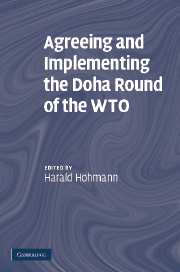Book contents
- Frontmatter
- Contents
- List of Contributors
- Foreword
- Introduction
- The future of the Doha Round
- PART ONE Development policy of the WTO
- 2 Developmental aspects of the Doha Round of negotiations
- 3a Aspects of development policy in the Doha Round – An EC perspective
- 3b An assessment of the Sixth WTO Hong Kong Ministerial Conference from a development perspective
- 4 Capacity building and combating poverty in the WTO
- 5 Integrating development and SDT (Special and Differential Treatment) into the architecture of the WTO – through the operation of its Dispute Settlement System
- PART TWO Trade policy (including competition) and trade facilitation
- PART THREE Reform of the dispute settlement system
- PART FOUR Social rights, health, and environment
- PART FIVE Conclusions
- Index
5 - Integrating development and SDT (Special and Differential Treatment) into the architecture of the WTO – through the operation of its Dispute Settlement System
from PART ONE - Development policy of the WTO
Published online by Cambridge University Press: 23 February 2010
- Frontmatter
- Contents
- List of Contributors
- Foreword
- Introduction
- The future of the Doha Round
- PART ONE Development policy of the WTO
- 2 Developmental aspects of the Doha Round of negotiations
- 3a Aspects of development policy in the Doha Round – An EC perspective
- 3b An assessment of the Sixth WTO Hong Kong Ministerial Conference from a development perspective
- 4 Capacity building and combating poverty in the WTO
- 5 Integrating development and SDT (Special and Differential Treatment) into the architecture of the WTO – through the operation of its Dispute Settlement System
- PART TWO Trade policy (including competition) and trade facilitation
- PART THREE Reform of the dispute settlement system
- PART FOUR Social rights, health, and environment
- PART FIVE Conclusions
- Index
Summary
Introduction
A consideration of development in the context of the Doha Round raises many issues. In this chapter the main focus is on Special and Differential Treatment (SDT) as an aspect of development, with particular reference to its integration into the architecture of the WTO through the dispute settlement system.
Thus far there has been no significant overall progress in the work of the Committee on Trade and Development (CTD) on SDT. However, the decisions in Annex F of the Hong Kong Ministerial Declaration with respect to Least-Developed Members are to be noted. The deliberations of the CTD generally seem to have started with a focus on detail, and have moved only latterly in terms of general conceptual approaches towards realising the objectives of the negotiations on SDT. The reverse might have been the case. As a matter of general negotiating approach the general thematic clusters and conceptualisation of the issues and potential proposals, should have been sorted out at the outset, in order to allow the issues and proposals raised during the negotiations to be pegged into them. As yet, it is not possible to discern the outline of the pillars of development and SDT in the architecture of the WTO. Some progress may, however, be discerned in terms of a measure of consensus in relation to the clarification and strengthening of some agreementspecific SDT provisions. Similarly, in relation to cross-cutting issues, the identification of capacity building and measures to improve the implementation of SDT provisions is to be noted – in particular the Monitoring Mechanism proposed by the African Group, which seems to have gained currency.
- Type
- Chapter
- Information
- Agreeing and Implementing the Doha Round of the WTO , pp. 133 - 142Publisher: Cambridge University PressPrint publication year: 2008



